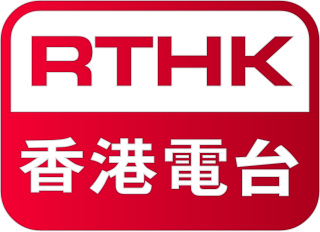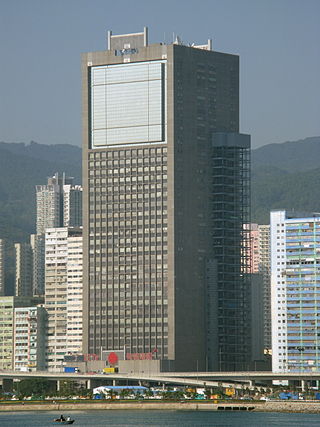| Geography of Hong Kong |
|---|
| Water |
| Other Hong Kong topics |
| Hong Kong Portal |
List of channels, straits and passages in Hong Kong
| Geography of Hong Kong |
|---|
| Water |
| Other Hong Kong topics |
| Hong Kong Portal |
List of channels, straits and passages in Hong Kong
Communications in Hong Kong includes a wide-ranging and sophisticated network of radio, television, telephone, Internet, and related online services, reflecting Hong Kong's thriving commerce and international importance.

The Islands District is one of the 18 districts of Hong Kong. It is part of the New Territories. It had a population of 185,282 in 2021.

Television Broadcasts Limited (TVB) is a television broadcasting company based in Hong Kong. The company operates five free-to-air terrestrial television channels in Hong Kong, with TVB Jade as its main Cantonese language service, and TVB Pearl as its main English service. TVB is headquartered at TVB City at the Tseung Kwan O Industrial Estate.

Radio Television Hong Kong (RTHK) is the public broadcasting service in Hong Kong. GOW, the predecessor to RTHK, was established in 1928 as the first broadcasting service in Hong Kong. As a government department under the Commerce and Economic Development Bureau of the Hong Kong Government that directly supported by annual government funding, RTHK's educational, entertainment, and public affairs programmes are broadcast on its eight radio channels and six television channels, as well as commercial television channels.
Television in Hong Kong is primarily in Cantonese and English. It is delivered through analogue and digital terrestrial, cable, IPTV, and the Internet. Satellite TV is not common, although many housing estates have dishes and re-distribute a limited number of free channels through coaxial cables. The dominant broadcaster is TVB, ViuTV and HOY TV.
TVB Jade, or simply Jade, is a Hong Kong Cantonese-language free-to-air television channel owned and operated by Television Broadcasts Limited (TVB) as its flagship service, alongside its sister network, the English-language TVB Pearl. Broadcasting started on 19 November 1967. It is headquartered at TVB City at the Tseung Kwan O Industrial Estate in Tseung Kwan O, in the Sai Kung District. Primarily broadcasting entertainment programming, TVB Jade has historically been the most dominant television channel in the region in terms of viewership, with its closest competitor having been the now-defunct ATV Home.

Green Island is an island off the northwest coast of Kennedy Town, Hong Kong Island, separated by the Sulphur Channel. A smaller island nearby to the east, uninhabited, is called Little Green Island (小青洲). Administratively, the two islands are part of Central and Western District.
Pillar Island or Tsing Chau was an island in the Kwai Chung area of Hong Kong, sitting at the mouth of Gin Drinkers Bay, by the side of the Rambler Channel, opposite Tsing Yi Island.

Fairchild TV or FTV (新時代電視), is a Canadian Cantonese language exempt specialty channel. It is owned by Fairchild Group, with Hong Kong broadcaster TVB holding a 20% minority stake. Fairchild TV has studios in the Greater Toronto Area and Greater Vancouver.

Lei Yue Mun is a short channel in Hong Kong. It lies between Junk Bay and Victoria Harbour, separating Kowloon and Hong Kong Island. The channel is an important passage for the city, forming the eastern entrance of Victoria Harbour.

Nam Long Shan or Brick Hill is a hill on the Hong Kong Island of Hong Kong, near Wong Chuk Hang and Aberdeen. At an elevation of 282 metres, it overlooks the South China Sea in the south, Sham Wan and Aberdeen Channel in the west, and Deep Water Bay in the east.

Hong Kong Cable Television Limited, formerly known as Wharf Cable Television Limited until 31 October 1998, is a cable television provider in Hong Kong currently owned by Forever Top (Asia) Limited, which operates it as a part of i-Cable Communications business. It was the second company to provide cable television services in Hong Kong. It was incorporated on 30 June 1993 and officially inaugurated on 31 October same year, offering a package of over 100 pay television channels, 54 of which are directly operated by the company.

Star Chinese Channel was a Taiwanese general entertainment television channel operated by The Walt Disney Company (Taiwan) Ltd. Its programming features drama, variety, lifestyle, and talk shows in Mandarin. Launched on 21 October 1991 at 16:30 Hong Kong Time by its predecessor Star TV, the channel originally targeted audiences in Greater China broadcasting in both Mandarin and Cantonese, before it reduced broadcasting area to just Taiwan and began broadcasting only in Mandarin on 30 March 1996. Both Star Chinese Channel, along with its sister channel Star Entertainment Channel, closing down on January 1, 2024, as Disney further enrolled Disney+ streaming platform.
Star Chinese Movies was a Chinese language pay television channel owned by Disney Networks Group Pacific Ltd. It featured Chinese films.

Eastern Broadcasting Company, originally called Eastern Television (ETTV), is a nationwide cable television network in Taiwan that is operated by the Eastern Broadcasting Group, which also operates the online news site ETtoday. ETTV began channel syndications in the United States in 2003 under the name of ETTV America. As of 2007, Eastern Television has sister channels in South America and the People's Republic of China. In November 2015, Eastern Television renamed as Eastern Broadcasting Company.
Articles related to Hong Kong include:
Mei Ah Entertainment Group Co., Ltd. is a media distribution company in Hong Kong.

Phoenix Television is a majority state-owned television network that offers Mandarin and Cantonese-language channels that serve mainland China, Hong Kong, Macau, and other markets with substantial Chinese-language viewers. It is headquartered in Shenzhen and Hong Kong. It is also registered in Cayman Islands.

The 35th Hong Kong Film Awards presentation ceremony took place in Hong Kong Cultural Centre on 3 April 2016. The host of the awards ceremony was Sean Lau. The state-owned China Central Television did not air the program as it had previously for every year since 1991; this was because the film nominated for best picture in the awards, Ten Years, was seen to be critical of China's influence over Hong Kong. The Chinese government was reported to have ordered the state broadcaster not to broadcast the ceremony.